Allison M. Dickson's Blog, page 14
July 1, 2013
Writers, I'm Getting Real Tired of Your Shit
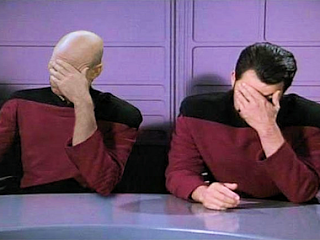
If you're submitting to agents or publishers before you've edited your manuscript, you need to die in a fire.
If you don't understand the purpose of freelance editors, beta readers, or the whole value of the editorial process, you need to go play in traffic.
If you think your book is just fine the way it is right after you wrote it or it's not even done yet but you think it's ready either for submission or uploading to Amazon or some other ebook publisher, please stop being a writer. Now. Just go to your manuscript and press Ctrl + A and then hit Delete.
You're clogging the system. You're standing in the way of people who take this job seriously. You're making the people whose job it is to read and sell books for a living hate their jobs a little more every day. People who hate their jobs usually start sucking at them. When agents and publishers start sucking at their jobs, it means idiots start getting book deals. Oh sure, maybe that's good for you because you're an idiot who wrote a book, but it's bad for the world at large to have to be subjected time and time again to literary drivel.
Every time you refuse to research the submission process or learn the way the writing industry works via helpful websites (like this one!) or edit your books or act like a professional, you are ensuring the steady degradation and eventual extinction of the very industry into which you are trying to break. In other words, YOU ARE MAKING US ALL LOOK BAD AND WASTING EVERYONE'S TIME. This isn't American Idol, where we need shitty contestants to draw in schadenfreude-craving viewers. This is real life where time is real and very prone to being wasted by people who seem to think they know better than the very professionals who have devoted their lives to this industry.
Please grow up. Please learn how this game works before you start playing it. Please stop undermining processes that have been in place and far supersede your supposed Best Book Evar Ritten. But really, just stop being a willfully ignorant, self-centered, entitled, arrogant twatface.
Thanks.
Published on July 01, 2013 18:10
June 24, 2013
The Five W's of Fiction Writing
Welcome to the portion of the writer blogging program where I use a well-established cliche to give you a good idea of what makes for compelling fiction! But first, a warning:

I don't know why, but I think this owl has the inner voice of Steven Wright.
I want to caution new writers against reading too many things like this. Some people get off on telling writers how to write. I used to, but I'm not quite so hot on it anymore (that being said, I hope anyone Googling my old writing advice finds something useful). These days, I feel greatly disinclined to lecture writers on all the things they're doing wrong, for the same reason I don't freelance edit much anymore. When it comes to art, I don't want to be the sage on the stage. I want to be down in the trenches with people growing right along with them. While I will always hold opinions as to what makes good writing good and bad writing bad, I think creators need to spend some time on their own exploring their creative space. I do think writing blogs and seminars and such can be valuable, but only if they foster excitement and the desire to go forth and create rather than squish writers into some kind of mold.
I have attended some great workshops on how to find voice and build worlds, and neither of them contained the word "don't." This is important, because when you start don't-ing people all the time, it starts to feel like a "rule." And rules and art make for very strange bedfellows. I've seen too many good writers succumb to "the rules" in my time, and I've read too many books that display technical prowess while at the same time failing to do the #1 thing I think every single book out there should do: making me give a fuck. I don't care how pretty and interesting your sentences and settings are. If I don't give a fuck, I'm not reading. And inspiring readers to care is really where your artistic sense comes in. I don't want to stomp on your creativity. I want to give you a reason to celebrate it.
With that out there, I'm going to use the Five W's (the Who, What, When, Where, and Why) of fiction writing. Really, they're a series of questions you can ask yourself to help you write a well-rounded story. Some of the questions will look at your actual work, some of them will look at you as an author. That's because there isn't a whole lot of separateness between the art and the artist. This might not all come to you right away, but the more you write, the more it's going to seep in and change you, the way water changes the shape of rock over long periods of time, and eventually you're going to be aware of these things without even thinking. But even grizzled and jaded veterans can stand to learn something new, too, so er'body pay attention.
1. WHO are you writing about?
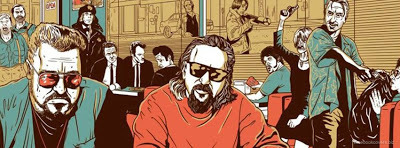
Some of the best characters ever...
It's in the #1 spot for a reason. Whether you're a reporter or a fiction writer, if you don't know who you're writing about, you're not going to have a whole hell of a lot to say that's worth a damn. Your characters are the most important things in your story. Let me repeat that: THE MOST IMPORTANT THINGS. It seems obvious, but so many people forget this. I have forgotten this too, and I often need reminding. Authors are a one-person band and so it's easy for us to get more enveloped in the concept of the story, the setting, the time period, the science and machinery. By the the time all that other stuff is developed, the character just becomes this shapeless avatar that moves at the writer's direction and succeeds or doesn't succeed according to the demands of the plot. The author hasn't told us anything about them, hasn't let us into their heads, hasn't given us a reason as to why we should trust this person to carry us through the story or be invested in their outcome. People sometimes confuse character development with info-dumping or back story. In my view, a character is a real person. A real person's present actions are often informed by their past ones. Some say you shouldn't put any of that in. I say bullshit. I say cram in as much as you can and then later, when you go back and reread, you can cut out the things that feel draggy or aren't actually germane to the story. All of our thought processes are retrospective to a certain extent, especially when you consider things like motivations. For instance, I'm going to be very cautious about opening the door when a stranger knocks on it if one time I was attacked by a couple of rogue vacuum cleaner salesmen. Maybe if your character is feeling trepidation of some kind when the doorbell rings, you relate that feeling to a past experience so we get a little more understanding about this particular person and her motivations. Because you know that in real life, if you've just survived an attack of some kind, when you hear a doorbell ring, the first thing YOU'RE going to be thinking about, even a little bit, is whether or not the person on the other side of that door is a good or a bad egg.
I'm not saying you should spend page upon page on a person's background, but you damn sure better be ready include relevant information that informs a character's present actions and decisions. It takes time and patience to do this. You have to ask yourself a lot of questions about your character. Turn off that voice of your plot trying to hurry you along, because plot is an asshole who thinks it has a schedule to keep but is really just a loudmouthed narcissist that thinks it's more important than it actually is. Okay, sure, yes, get to your plot. You'll have to eventually. But more importantly, tell the story of your characters, paint in those fine details. Make them feel like real people, and no one will ever forget them. Spend a good bit of time learning who you are writing about and people will love your story.
2. WHAT do you write?

Oh you had a unicorn astronaut erotica story in mind? I just wrote it...
This is your story in a nutshell. What's it's all about. Of course that's going to be important, but I love the saying that the late and great Roger Ebert used when he talked about movies (and it applies just as well to books): It's not what it's about. It's how it's about it.
In other words, I try not to be so concerned about originality. People like to hem and haw about original ideas and things that are "derivative" (I hate that word. Every time I hear it, I punch an orphan--no lie). You know how many books and movies are out there about robots and vampires and dying kids and cheating husbands and murderers and wars? There are only so many ways to present conflict. There is nothing new under the sun... EXCEPT your own storytelling DNA, something that is unique to all of us. It's our voices and our "mannerisms" and our characteristic way of combining words into rhythms and sounds that no one else quite has. Joe Hill, for instance, may write horror and he may have some of his dad Stephen King's knack for capturing the surreal and macabre aspects of everyday life, but he is still very much Joe Hill. You sit both of these men down to write a story about a scary clown or a killer pandemic, and you will not get the same two stories. No one else could have written It or The Stand. And that's good to keep in mind if you have a scary clown or killer pandemic story to tell. Maybe this concept is REALLY speaking to you and all you have to do is open your skull and let the thing splat out of your forehead onto the paper (metaphorically, of course). But then you hear of another author who is kinda sorta telling the same story. Or you hear that nobody wants to read zombies and vampires anymore or that your concept was part of a fad that died out six months ago.
DON'T let this discourage you (oh crap, I said "don't", but when it comes to this I don't care)! Story ideas aren't unique, but you are. I can guarantee that as long as you aren't plagiarizing, your story is a special snowflake. All this is to say that if you're feeling that idea burning a bright flame in your head, WRITE IT. That story is going to be a hell of a lot better than some perfunctory thing you wrote because you wanted to cater to the fickle whims of the market in an effort to get your name out there. The What of it all is what's getting you off most at that moment. It's the mojo.
3. WHEN do you write?

There's twiddling thumbs, and then there is this
This isn't about period fiction or setting or anything like that. This is about the "when" of your habit. Everyone has a rule for when you write and there are two schools of thought here. Some writers write every day, even if they don't want to. Even if it they feel all they're doing is "shoveling shit from a sitting position" (Stephen King, again...you can't escape the man's wisdom there), because it's possible that what they write is never as bad as they think it is. In fact, it could be downright great. I've surprised myself that way a few times. Others think you shouldn't force it. If you're not feeling it, it's like sitting on a toilet to take a crap when you don't have to (Chuck Palahniuk there, at least paraphrasing), and eventually you're going to start to resent the process and then not do it at all.
Neither of these things are wrong, precisely. However what's true of both of them is that if you're going to be a writer, you DO have to do the work. The shit doesn't write itself. I've gone sometimes two months without writing a word of fiction, particularly after I've just finished a big project, but I gave myself permission for that the same way someone gives themselves a little vacation once or twice a year. Writing is like any other job. You really should take breaks once in awhile. Do something else. Live a little. I need that time away to let the inspiration storage tanks in my brain refill. I need time to clear the old world out of my head so I can start something else with a blank slate. But the caveat is that I DO eventually have come back. It's not just some "okay I'll write whenever" kind of thing. It might be for someone who writes as a hobby, but this is my job. No one can do a job like that, I don't care if you're writing books or writing prescriptions. Do it long enough like that, and you're fired. I spoke recently about my mind being in kind of a fuzz and that I've been spinning my wheels a bit trying to get something done. The thing is, I still had to sit down and try to write. Didn't matter if it was working on a short story or one of the novels I have going. I couldn't just do nothing and cry about how nothing was turning out. I actually had to try. Some days it works, some days it doesn't, but at least I'm plugging away at something. Career writers should be writing every chance they get. But you should also not feel bad for taking a little step away to regain your perspective if the walls are closing in. The only thing that separates writers from dreamers is that writers write. I'm sure someone's coined that already, but whatever.
4. WHERE do you write?

Step into my office...
I crack myself up sometimes. I have an office now. When I moved into this house, I was most excited about having my own work space. I painted it up all nice. It has all all my great things in it, like my coconut monkeys and my Living Dead Dolls pencil sharpener and my Sigmund Freud action figure and my Attack of the 50ft Woman poster. It also has my awesome Whiteboard of Ideas. Don't get me wrong, I do spend a good bit of time in there. I record podcasts in my office. I do a lot of editing in there too. But lately, for the last couple writing projects, I've found myself right back on my laptop in another room. I don't know why this is. Maybe I just like writing with my feet up. It could be a lighting issue or something more mystical happening with the energies in my living room, or some other horseshit. Who the heck knows? The where of writing is where you need to be in order to free your mind and devote it to the matter at hand, even if it's only for an hour a day. Whether it's a Starbucks or your library or your bedroom with the door closed and the phone ringer off. Whatever. Make that time to go where you need to go, so you can go where you need to go.
Now to address the family and friends of writers, because this is equally important: give the artist in your life a little space. If you're creating an environment that is toxic and not conducive to someone's creativity, please stop. Don't sit in a room and talk endlessly to someone who has a word document open and is clearly trying to type in it. Don't get mad when someone has to turn off their phone ringer for an hour or two a day so they can get some work done. Don't interrupt the process. We're not out to completely monopolize the time of everyone else, but all we are asking is a little breathing room and consideration for the monumental effort it sometimes takes to get into the zone. If you don't believe me, just ask Jack:
5. WHY are you writing? Or why AREN'T you?
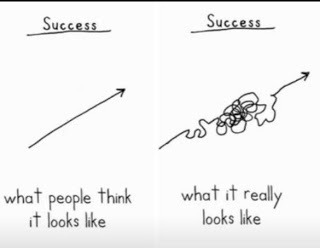
Sometimes internet cliches can be profound
Ask yourself this every so often, especially if things aren't going great. But even if they are, it's not a bad idea. Living by rote tends to take its toll after awhile, no matter what your profession. Life is a dynamic thing and you can either move with it or be moved by it. Hopefully you're not doing this to get rich, because yeah... bad idea all around. Maybe your direction and ambition has changed. You haven't gotten the big book deal you dreamed about when you started this whole thing, or your indie sales have been in the dump, and you've gotten a few bad reviews on top of it and you just feel like a hack. Sometimes these are phases that you go through and get over in due time, but if it's been a year or more that you've felt miserable as an author, maybe it is time to ask yourself why you're still doing it. Do you feel that it's because you've already committed so much time to the process and you don't know how to move on without having a whole lot of accomplishments to show for it? The ego can be an unmerciful mistress sometimes, resistant to change, but that's no reason not to challenge it.
On the flip-side, say you've been wanting to write for a long time, but you haven't yet. Why? What's stopping you? Are you feeling overwhelmed by the commitment or the details involved in telling a story? Are you feeling a little guilty because you were raised to believe that telling stories is for little children and that you should be doing "real work?" Do you feel like there just aren't enough hours in the day, especially when you have kids or a day job or other things getting in the way of you giving yourself that time you need to do anything that brings you pleasure? Even if you're a regular writer who hasn't written for awhile, it's a good idea to assess why you don't want to write. Maybe the idea exhausts you. Burn out is for real and you should attend to it. Whatever the reason, it's a good idea to subject yourself to this sort of reflection every so often. Maybe you don't want to answer "why" because it could mean facing some truths about your present and future circumstances that you're not ready for yet. But eventually you're going to get miserable enough that you're not going to have much choice and the answer is going to be staring you right in the face. Either way, I hope the answers result in change for the better.
And that goes for all these questions. I hope they help you dig a little deeper.

I don't know why, but I think this owl has the inner voice of Steven Wright.
I want to caution new writers against reading too many things like this. Some people get off on telling writers how to write. I used to, but I'm not quite so hot on it anymore (that being said, I hope anyone Googling my old writing advice finds something useful). These days, I feel greatly disinclined to lecture writers on all the things they're doing wrong, for the same reason I don't freelance edit much anymore. When it comes to art, I don't want to be the sage on the stage. I want to be down in the trenches with people growing right along with them. While I will always hold opinions as to what makes good writing good and bad writing bad, I think creators need to spend some time on their own exploring their creative space. I do think writing blogs and seminars and such can be valuable, but only if they foster excitement and the desire to go forth and create rather than squish writers into some kind of mold.
I have attended some great workshops on how to find voice and build worlds, and neither of them contained the word "don't." This is important, because when you start don't-ing people all the time, it starts to feel like a "rule." And rules and art make for very strange bedfellows. I've seen too many good writers succumb to "the rules" in my time, and I've read too many books that display technical prowess while at the same time failing to do the #1 thing I think every single book out there should do: making me give a fuck. I don't care how pretty and interesting your sentences and settings are. If I don't give a fuck, I'm not reading. And inspiring readers to care is really where your artistic sense comes in. I don't want to stomp on your creativity. I want to give you a reason to celebrate it.
With that out there, I'm going to use the Five W's (the Who, What, When, Where, and Why) of fiction writing. Really, they're a series of questions you can ask yourself to help you write a well-rounded story. Some of the questions will look at your actual work, some of them will look at you as an author. That's because there isn't a whole lot of separateness between the art and the artist. This might not all come to you right away, but the more you write, the more it's going to seep in and change you, the way water changes the shape of rock over long periods of time, and eventually you're going to be aware of these things without even thinking. But even grizzled and jaded veterans can stand to learn something new, too, so er'body pay attention.
1. WHO are you writing about?

Some of the best characters ever...
It's in the #1 spot for a reason. Whether you're a reporter or a fiction writer, if you don't know who you're writing about, you're not going to have a whole hell of a lot to say that's worth a damn. Your characters are the most important things in your story. Let me repeat that: THE MOST IMPORTANT THINGS. It seems obvious, but so many people forget this. I have forgotten this too, and I often need reminding. Authors are a one-person band and so it's easy for us to get more enveloped in the concept of the story, the setting, the time period, the science and machinery. By the the time all that other stuff is developed, the character just becomes this shapeless avatar that moves at the writer's direction and succeeds or doesn't succeed according to the demands of the plot. The author hasn't told us anything about them, hasn't let us into their heads, hasn't given us a reason as to why we should trust this person to carry us through the story or be invested in their outcome. People sometimes confuse character development with info-dumping or back story. In my view, a character is a real person. A real person's present actions are often informed by their past ones. Some say you shouldn't put any of that in. I say bullshit. I say cram in as much as you can and then later, when you go back and reread, you can cut out the things that feel draggy or aren't actually germane to the story. All of our thought processes are retrospective to a certain extent, especially when you consider things like motivations. For instance, I'm going to be very cautious about opening the door when a stranger knocks on it if one time I was attacked by a couple of rogue vacuum cleaner salesmen. Maybe if your character is feeling trepidation of some kind when the doorbell rings, you relate that feeling to a past experience so we get a little more understanding about this particular person and her motivations. Because you know that in real life, if you've just survived an attack of some kind, when you hear a doorbell ring, the first thing YOU'RE going to be thinking about, even a little bit, is whether or not the person on the other side of that door is a good or a bad egg.
I'm not saying you should spend page upon page on a person's background, but you damn sure better be ready include relevant information that informs a character's present actions and decisions. It takes time and patience to do this. You have to ask yourself a lot of questions about your character. Turn off that voice of your plot trying to hurry you along, because plot is an asshole who thinks it has a schedule to keep but is really just a loudmouthed narcissist that thinks it's more important than it actually is. Okay, sure, yes, get to your plot. You'll have to eventually. But more importantly, tell the story of your characters, paint in those fine details. Make them feel like real people, and no one will ever forget them. Spend a good bit of time learning who you are writing about and people will love your story.
2. WHAT do you write?

Oh you had a unicorn astronaut erotica story in mind? I just wrote it...
This is your story in a nutshell. What's it's all about. Of course that's going to be important, but I love the saying that the late and great Roger Ebert used when he talked about movies (and it applies just as well to books): It's not what it's about. It's how it's about it.
In other words, I try not to be so concerned about originality. People like to hem and haw about original ideas and things that are "derivative" (I hate that word. Every time I hear it, I punch an orphan--no lie). You know how many books and movies are out there about robots and vampires and dying kids and cheating husbands and murderers and wars? There are only so many ways to present conflict. There is nothing new under the sun... EXCEPT your own storytelling DNA, something that is unique to all of us. It's our voices and our "mannerisms" and our characteristic way of combining words into rhythms and sounds that no one else quite has. Joe Hill, for instance, may write horror and he may have some of his dad Stephen King's knack for capturing the surreal and macabre aspects of everyday life, but he is still very much Joe Hill. You sit both of these men down to write a story about a scary clown or a killer pandemic, and you will not get the same two stories. No one else could have written It or The Stand. And that's good to keep in mind if you have a scary clown or killer pandemic story to tell. Maybe this concept is REALLY speaking to you and all you have to do is open your skull and let the thing splat out of your forehead onto the paper (metaphorically, of course). But then you hear of another author who is kinda sorta telling the same story. Or you hear that nobody wants to read zombies and vampires anymore or that your concept was part of a fad that died out six months ago.
DON'T let this discourage you (oh crap, I said "don't", but when it comes to this I don't care)! Story ideas aren't unique, but you are. I can guarantee that as long as you aren't plagiarizing, your story is a special snowflake. All this is to say that if you're feeling that idea burning a bright flame in your head, WRITE IT. That story is going to be a hell of a lot better than some perfunctory thing you wrote because you wanted to cater to the fickle whims of the market in an effort to get your name out there. The What of it all is what's getting you off most at that moment. It's the mojo.
3. WHEN do you write?

There's twiddling thumbs, and then there is this
This isn't about period fiction or setting or anything like that. This is about the "when" of your habit. Everyone has a rule for when you write and there are two schools of thought here. Some writers write every day, even if they don't want to. Even if it they feel all they're doing is "shoveling shit from a sitting position" (Stephen King, again...you can't escape the man's wisdom there), because it's possible that what they write is never as bad as they think it is. In fact, it could be downright great. I've surprised myself that way a few times. Others think you shouldn't force it. If you're not feeling it, it's like sitting on a toilet to take a crap when you don't have to (Chuck Palahniuk there, at least paraphrasing), and eventually you're going to start to resent the process and then not do it at all.
Neither of these things are wrong, precisely. However what's true of both of them is that if you're going to be a writer, you DO have to do the work. The shit doesn't write itself. I've gone sometimes two months without writing a word of fiction, particularly after I've just finished a big project, but I gave myself permission for that the same way someone gives themselves a little vacation once or twice a year. Writing is like any other job. You really should take breaks once in awhile. Do something else. Live a little. I need that time away to let the inspiration storage tanks in my brain refill. I need time to clear the old world out of my head so I can start something else with a blank slate. But the caveat is that I DO eventually have come back. It's not just some "okay I'll write whenever" kind of thing. It might be for someone who writes as a hobby, but this is my job. No one can do a job like that, I don't care if you're writing books or writing prescriptions. Do it long enough like that, and you're fired. I spoke recently about my mind being in kind of a fuzz and that I've been spinning my wheels a bit trying to get something done. The thing is, I still had to sit down and try to write. Didn't matter if it was working on a short story or one of the novels I have going. I couldn't just do nothing and cry about how nothing was turning out. I actually had to try. Some days it works, some days it doesn't, but at least I'm plugging away at something. Career writers should be writing every chance they get. But you should also not feel bad for taking a little step away to regain your perspective if the walls are closing in. The only thing that separates writers from dreamers is that writers write. I'm sure someone's coined that already, but whatever.
4. WHERE do you write?

Step into my office...
I crack myself up sometimes. I have an office now. When I moved into this house, I was most excited about having my own work space. I painted it up all nice. It has all all my great things in it, like my coconut monkeys and my Living Dead Dolls pencil sharpener and my Sigmund Freud action figure and my Attack of the 50ft Woman poster. It also has my awesome Whiteboard of Ideas. Don't get me wrong, I do spend a good bit of time in there. I record podcasts in my office. I do a lot of editing in there too. But lately, for the last couple writing projects, I've found myself right back on my laptop in another room. I don't know why this is. Maybe I just like writing with my feet up. It could be a lighting issue or something more mystical happening with the energies in my living room, or some other horseshit. Who the heck knows? The where of writing is where you need to be in order to free your mind and devote it to the matter at hand, even if it's only for an hour a day. Whether it's a Starbucks or your library or your bedroom with the door closed and the phone ringer off. Whatever. Make that time to go where you need to go, so you can go where you need to go.
Now to address the family and friends of writers, because this is equally important: give the artist in your life a little space. If you're creating an environment that is toxic and not conducive to someone's creativity, please stop. Don't sit in a room and talk endlessly to someone who has a word document open and is clearly trying to type in it. Don't get mad when someone has to turn off their phone ringer for an hour or two a day so they can get some work done. Don't interrupt the process. We're not out to completely monopolize the time of everyone else, but all we are asking is a little breathing room and consideration for the monumental effort it sometimes takes to get into the zone. If you don't believe me, just ask Jack:
5. WHY are you writing? Or why AREN'T you?

Sometimes internet cliches can be profound
Ask yourself this every so often, especially if things aren't going great. But even if they are, it's not a bad idea. Living by rote tends to take its toll after awhile, no matter what your profession. Life is a dynamic thing and you can either move with it or be moved by it. Hopefully you're not doing this to get rich, because yeah... bad idea all around. Maybe your direction and ambition has changed. You haven't gotten the big book deal you dreamed about when you started this whole thing, or your indie sales have been in the dump, and you've gotten a few bad reviews on top of it and you just feel like a hack. Sometimes these are phases that you go through and get over in due time, but if it's been a year or more that you've felt miserable as an author, maybe it is time to ask yourself why you're still doing it. Do you feel that it's because you've already committed so much time to the process and you don't know how to move on without having a whole lot of accomplishments to show for it? The ego can be an unmerciful mistress sometimes, resistant to change, but that's no reason not to challenge it.
On the flip-side, say you've been wanting to write for a long time, but you haven't yet. Why? What's stopping you? Are you feeling overwhelmed by the commitment or the details involved in telling a story? Are you feeling a little guilty because you were raised to believe that telling stories is for little children and that you should be doing "real work?" Do you feel like there just aren't enough hours in the day, especially when you have kids or a day job or other things getting in the way of you giving yourself that time you need to do anything that brings you pleasure? Even if you're a regular writer who hasn't written for awhile, it's a good idea to assess why you don't want to write. Maybe the idea exhausts you. Burn out is for real and you should attend to it. Whatever the reason, it's a good idea to subject yourself to this sort of reflection every so often. Maybe you don't want to answer "why" because it could mean facing some truths about your present and future circumstances that you're not ready for yet. But eventually you're going to get miserable enough that you're not going to have much choice and the answer is going to be staring you right in the face. Either way, I hope the answers result in change for the better.
And that goes for all these questions. I hope they help you dig a little deeper.
Published on June 24, 2013 13:22
June 19, 2013
This is Why I Pants

Mmm... chocolate, peanuts, fucks
I want to preface this by saying that Libba Bray is my new favorite blogger of all time. Her article today on Writing Despair (Juice Box Mix) spoke so much to the state of my soul at this very moment that I felt no other recourse but to write my own bloggy version of "I know, right?!"
I think it's safe to say that for the last, oh, six months or so, I've been in a bit of what one might call a creative clusterfuck. 2012 was probably my best year yet for actual writing. I finished The Last Supper, got a book deal. Wrote and finished Strings, got a book deal on that. I wrote a great number of well-reviewed short stories, and then hunkered down to make 2013 EVEN BETTER. Write and release one short story a month! Finish Colt Coltrane and The Shiva Paradox and get MOAR BOOK DEALS! But things didn't quite happen that way, as they rarely do when I make very specific plans (which are very much like outlines for life, and I hate outlines with an ever-bleeding passion, which Libba Bray echoed so beautifully in her blog, but that I also ranted about here many moons ago).
So, with 2013 half gone (seriously, what the fuck?), here's how my plans have shaken down so far: I finished the final editing on The Last Supper back in March. It's in the middle of layout with Hobbes End and should be going to press within the next month or so, so that's exciting. I did manage to finish the first draft of Colt Coltrane and the Lotus Killer back in February, but it's currently languishing in the lower depths of editing hell. I have written/finished/released four short stories this year. Seeing as how it's entering late June as I write this, I've fallen shy of my one a month quota and might just finish with my usual 6-8 by the time 2013 ends. I think I may have taken a passing glance at Shiva, decided that the entire third act I'd been building was abysmal, deleted it, and then put it away with a sense of defeat and disgust branded on my soul.
I also made attempts at dreaming up sequels to Strings and The Last Supper, and I do have solid ideas for both of them, but I'm discovering I have a bit of a problem writing sequels that I will have to address in a future post. But other than that, things have been, again, clusterfucky. The problem hasn't been NO ideas, but too many, which a lot of people think is not really a problem, but it kind of is. It's the equivalent of having a walk-in closet full of cute outfits, but none of them fitting or looking "just right" when you go to put them on, so you wind up standing in the aftermath of an EF-5 clothing twister, wondering what became of your once semi-ordered life. So then you cry out to the cold-hearted bitch of a universe to please just give you ONE GOOD IDEA TO WORK WITH! Maybe even The One that will finally make you disgustingly Dan Brown or at least modestly Chuck Palahniuk famous.

Hey everybody! I found a cache of gerunds!
Well, the universe did spit something at me. Kind of. I have found that story ideas almost never come to me whole. They usually come in fragments, like the very tip of a gigantic something that must be unearthed in a colossal and complex archaeological dig. Sometimes that artifact is one good line. The Last Supper started that way ("My Last Supper comes with a salad.") as did Abner's Wisdom ("For the longest time, Max blamed the kitty litter") and Epilogue ("I died while looking at the back of my husband's head."). They're like phantom whispers from the ether, and they're sticky little buggers that insist on being used somehow, somewhere. I usually examine them and turn them around in my brain for several days, seeing what will grow from them. Sometimes they start the story and stay intact. Other times, I find the line is just a tool to get the dig started. My most recent one for my current work in progress, STATIC, happened the same way. "Jeff Erlbaum wasn't sure it was safe to take his dog's painkillers, but it was all he had." That line started a few rough paragraphs on page one, but has since been replaced by something else, though the original line is still in the text several pages in.
But that line has evolved into a 21K-word and counting rambling crimey homage to small-town crooks, baseball, and maybe a little redemption (or non-redemption). I had no clear plot in mind when I started writing. Just that one line, and then a scene about a guy who got shot, but was rescued in the nick of time by his rottweiler named Chet, who sacrificed himself to take out the would-be assassin. I built it from there, scene by scene. Maybe Jeff Erlbaum somehow pissed off a local organized crime guy, and that's why he got shot. Sounds good. And maybe he didn't want to take his dog's painkillers because he's a recovering pill junkie! Done. And... and Maybe a bullet fragment entered his skull during the shooting and now he can hear radio voices in his head...from the future. BAZINGA!
There was a concept but not a lot of plot, and that was okay. I just wanted to grow the scenes and stack them up one on top of the other, introducing a colorful cast of characters along the way. I had no idea from one moment to the next what the fate of Jeff Erlbaum would be. I had some ghosts of ideations floating around in my mind, but nothing concrete. But of course, at some point, we all have to pay attention to that annoying machinery and ask "Where is this damn thing actually going?" And it's at that point that a story can either jump to the next level or die like a baby bird in the hand.
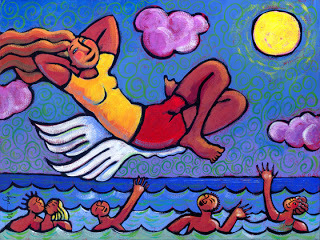
Either fly by the seat of your pants
or drown with the needle-fingered outline people?
That answer didn't occur to me until I was in the middle of writing a pivotal scene in chapter 5. Maybe it was because I enjoyed writing the cop character I'd introduced, but there was something about the scene and the way it was helping to sum up everything that had happened to the main character so far that acted like a pickax on the stubborn part of this dig, and a huge section of dirt and debris fell away to reveal the amazing structure lying beneath, a lost city no one had ever even known about until now.
I never could have gotten there by trying to plot an outline (i.e. planning it). The only way I could have gotten there was by doing the actual digging, the writing, and not trying to question the story into an early death (i.e. pantsing it). I'm not saying it will happen this way for everyone every time. Some people need those outlines. They require a scaffold and artifice in place before they can start building, and that's okay. But for the rest of us, sometimes, even when it doesn't make sense and doesn't seem like it's going anywhere and it feels like you're spinning your wheels and kicking dirt, what you're actually doing is digging deeper. And when you dig deep, you will sometimes loosen the one thing that will open up a whole hidden world for you.
And the feeling when that happens... it's like a drug. It's like huffing pure creativity. It's why I write.
Published on June 19, 2013 07:14
June 4, 2013
AutoCrit or My Rage at the Pedantic Homogenization of Art and the Robots that Make it Possible
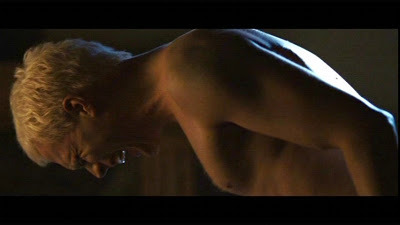
That's one tug on the cilice for every adverb...
Wanna know a little secret? Writers kind of hate themselves. They really do. When they aren't thinking dark thoughts about spiraling into total irrelevance or dying in the gutter before the world discovers their genius, they're self-flagellating over their supposed bad habits, such as their overuse of certain words and sentence structures and adverbs and things. They worry themselves half bald and insane over "the rules" and they think if they master them and become technically flawless, they will finally get that book deal and live happily ever after. It's no different than what any other artist does, really, but the neurosis seems to be concentrated particularly hard in the writing community, because there are just SO MANY WAYS in which an author can go wrong. So many variables. So many... WORDS and ways to mess them up. Well, combine that age-old anxiety with the technology of the modern age, and what do you get?
AutoCrit!
This self-described Editing Wizard will "with the click of a button" show you "all the problems with your manuscript!"
Of course, it goes wrong pretty much immediately, doesn't it? "All the problems with your manuscript" is such a negative phrase that it might as well be "all the ways in which you fucking suck as a writer." It drives me nuts, really, because I don't believe anything good ever comes from a place of shame. I don't care if we're talking about weight loss or writing a story. Once you start seeing your life as nothing more than a series of problems that need fixing, you're in for one shitty roller coaster of a life that only gets worse as it rolls on. You might think getting kicked in the balls repeatedly is helping you somehow, but all it does it turn you into someone who overcompensates later. It's just not good.
So how does this whole AutoCrit thing work? Well, after you plug in your manuscript, or a chunk of it (the free version will let you do 500 words, which isn't a great sample but works for demonstrative purposes) the program will give you a series of "reports" that help you target everything from overused words to cliches to adverb usage to homonyms to sentence fragments (and that's not all!). In other words, it will micromanage your novel into lube-free anal penetration territory, all for the fee of $47 to $117, depending on the level of rectal assault you're looking for. I plugged a few paragraphs into the free version just to see what it found. You can see some of this sexiness in the picture below:
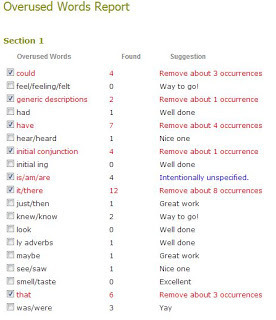
Remove three of your six occurrences of the word "that", and you too will be the next Hemingway!
This sounds great on the surface, I suppose. AutoCrit seems like it can do what any competent and literate editor can do at a fraction of the cost. Yeah, I guess that's cool in some ways. But it's also freaking terrible too when you really think about it.
There is a difference between a human and a robot when it comes to editing. For one thing, I'm not perfect and no editor is. We're going to miss things that AutoCrit probably will catch. There is also a very high likelihood that there will even still be some objective mistakes (like spelling and punctuation errors) left behind when we finish the job. Try as we might, it happens in nearly every single book. Even the ones published by the big boys.
And that's... okay!
But how is that okay? Aren't we looking for perfection here? No, dammit! Just... no. I submit that while excessive use of adverbs should be curtailed, the occasional one or five isn't going to kill anyone. I also submit that 'tis better to have slightly messy language than it is to have flat characters and a boring story. That's ART, damn it! Those little flaws and idiosyncrasies are often what separate one writer from the next. It's what reminds us all that works of art are created by imperfect human beings and not machines, and that's okay because a judicious display of imperfection is fucking beautiful.

You can't fool us, Miley. You're not a great singer.
But whatev.
It bothers me that we think we can just sterilize our writing or whittle it down to satisfy some mechanical algorithm the way AutoTune can make singers sound like they have a rudimentary grasp of pitch. It bothers me that artists are allowing themselves to become so concerned about mechanics that they forget to be actual storytellers. Language can be cleaned up later, but first you must TELL YOUR STORY, and it's amazing how many people have this whole thing turned around backward. You can have the most amazing technical writing skills in the world, but without artistry and a story that makes people give a shit, you might as well be writing a washing machine manual.
But I can hear people saying, "I already know how to tell a story really well! I'm a self-published author. I don't have or can't afford one of them big fancy New York editors to help me find all my uses of 'that' and 'was/were'."
Okay, fine. Let's say you don't have a single person in your life who can read your manuscript and be smart enough to pick out even a quarter of the things AutoCrit claims to find. What about you? What can you find? There are a million ways you can customize the Find/Replace feature in any word processing program to search out certain words and turns of phrase so that you can address them directly. Certainly you don't need to spend upwards of fifty bucks to find how many times you used the word "that." Also, what about taking the time to read your work aloud to find inconsistencies and repetitive words and other phrasing problems? What about printing it out and reading it on paper? That's another great way to find awkward phrasing and mistakes. Again, not something you really need to pay a robot to do for you. And why would you even want to anyway? If you turn that process of refining your prose into something completely automated, then what exactly are you learning about the craft? How are you developing a style and voice all your own?
The answers to those questions are: nothing and you aren't. Not really. You have to do the work. And you have to keep doing it, repeatedly, so you can improve. And just as soon as you think you're good enough, you get another wake up call, because you're probably starting to get lazy by that point. If there is anything I find offensive about this whole automated editing software thing, it's that it's just soooo lazy. It takes away that whole "doing" aspect of the craft that is so important for growth. If all we ever have to do is spit out words and shoot the resulting story through a robot's brain to find everything that some algorithm says is incompatible with desirable fiction and prose, then can you really say you have crafted anything? No, you can't. Just like you can't stick a metal rod into a forge and then say you made a sword. You haven't pounded the fuck out of it with your hammer yet. You haven't shaped it into something that is uniquely yours and adheres to your voice and your style. You haven't immersed yourself into the gritty, sweaty, awful, wonderful, shitty, amazing world of Making Your Art.
Whatever you think Autocrit can do for you, here's what it can't do:
It can't give you a voice. It can't breathe life into your characters and make them act and speak in ways that make readers swoon and cry and seethe. It can't help you make ART. Those things that AutoCrit claims it can do... humans have been doing them for thousands of years. In that time, we managed to produce gorgeous works of the written word. I wonder what Dickens or Twain or Tolkien or Asimov or King or Austen or Woolf or Atwood would think about something like AutoCrit. They would probably think it was a horrifying way to scrub all of the personality out of a piece of writing. To sterilize all possible flaws and idiosyncrasies that make a piece of writing memorable or an author special. Those words you throw down on the page, perfect or imperfect, are your literary thumbprint.

Sure, clean up your work. Editing remains as necessary as ever, but don't leave it to the wiles of a digital, inhuman spurt of code that doesn't understand things like ruggedness and context and style and artistic intent. And don't be afraid that maybe you abused a few adverbs or dialog tags or turns of phrase in the course of tens of thousands of words. It happens, and you shouldn't beat yourself up for it. Agents and readers aren't looking for that so much as they are looking to be entertained. And rather than see your manuscript as full of problems, embrace your imperfections and then just let go. It's that moment, after the realization of your true voice and the ultimate release, that is when the real magic happens.
Published on June 04, 2013 19:10
May 25, 2013
Fat Girl, Hot Yoga
Before
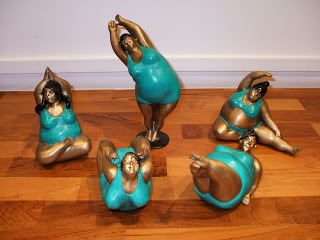
"I can't do that because I'm fat."
I can't skydive, I can't zip line, I can't run, I can't do a cartwheel, I can't sit with my legs neatly crossed, I can't swim a mile (oh wait... never mind, I CAN do that, check that one off the list).
But those are major things, and I don't feel troubled by much of that, anymore than I don't feel particularly troubled by my inability to carry a tune or memorize Pi beyond four digits. But then then my size started getting in the way of the little everyday things. My left knee hurts when I climb stairs or get out of the car. My lower back is a nest of electrified rusty nails, and my hips start screaming at me when I go for long walks. Climbing stairs is a laborious process that sometimes requires me to take each step one at a time like a toddler, depending on how my knee is behaving. Oh, and getting up off the floor from a sitting position? Good luck with that. That I have to hesitate to find out what the "weather" is like in my joints before bounding around is something that particularly irks me. For the first time in my life, I can feel my weight IN my bones. Believe it or not, even as a fat person, I've been able to glide quite reasonably through the day to day. I do my best to take large and confident steps, I hold my head up high and look people in the face and smile when I talk to them. I don't waddle. I sit up straight. But all those things have gotten so much HARDER over the last couple years. For the first time in my life, my body is telling me that I'm not a kid anymore.
But then there was always yoga staring me in the face. I've heard so many wonderful testimonials on what it does for the body, but I am also a Buddhist, so I am familiar with the concepts of what it can do for the mind too. But I kept putting it off, and gradually I stopped meditating too, and my spirit has suffered tremendously because of it. In recent weeks I've begun to feel that need again to tune back into myself, and I think the aches and pains I've been feeling in my body are signs that I need to do just that.
So I bought a Groupon. One month of unlimited hot yoga classes at a place less than a mile from my house. I considered it a Mother's Day present to myself. For the week following, I agonized over setting that appointment for that first class. I was making a fool out of myself, I thought. I was going to be a rhino in a room full of flamingos. Never mind that I also have psoriasis on my arms and hands, so yet ANOTHER way to stand out. I was a red-speckled rhino. Why not do yoga at home?
Riiiight. I'd long stopped being ashamed of my psoriasis. It's either put it out there into the world or hide, and I refuse to hide from anyone.
I even doubled down spent $90 on a new yoga wardrobe. And then I did what I do before I enter ANY situation in which I'm pretty sure I'm going to be the odd one out. I pull down the veil and power forth anyway and DEFY anyone to say any different. "Fake it until you make it" has been the one mantra that has guided me through most of my life, and it has fooled a lot of people into thinking I'm more confident than I actually am, but that's the point. And this morning, that mantra guided me right through the doors of Hot Yoga Dayton just before 8 a.m, towel and water and rolled-up mat in hand.
During
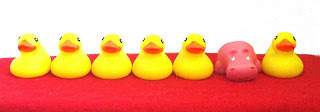
After signing the little waiver that stated I'm pretty much responsible for my own health, I put my purse and jacket and shoes in a cubby and proceeded into the yoga studio. It was dimly lit, thank goodness. And hot, yes. Definitely hot. Around 95 degrees and humid. But it wasn't all that bad, actually. I was prepared to be hot and I'd hydrated really well beforehand. I took time to briefly glance at all the people around me who were either sitting or lying on their mats. None of them were as big as me, but there were a few who were generous through the hips and whatnot. There were also a number of older people (the woman next to me was silver haired and likely approaching her eighties) and some younger people too. Everyone was quiet and nice and keeping to themselves. I felt comfortable. Or as comfortable as one can feel in such a warm space with absolutely no idea what's in store.
If you're not familiar with bikram yoga poses, you can visit this link to get an idea of what we did. And also keep in mind that anything I did was the absolute remotest approximation. But I'll get to that in a bit.
We started with a series of breathing exercises and warm-up poses. By the end of that little bit, I realized that was the hardest I'd worked my body in a very long time. But then we pressed forward, and I started to get a true sense of what my body was capable of and what it wasn't. I couldn't cross my legs and arms fully for the Eagle pose, let alone stay balanced for even 30 seconds in what derivative of it I could accomplish. There was no getting up on the balls of my feet for the Awkward pose. I think I was able to get my leg out to 45 degrees (or less) for the Standing Head to Knee, but staying balanced for that was also difficult. I wobbled. A LOT. I rocked the Triangle pose, but the Tree pose was utterly comical. Locust and Full Locust were more like Paralyzed Newborn (if there is such a thing) and instead of the Bow pose, I did the Bridge, which was a lot easier.
I took breaks for water whenever I needed to. There were a few times when I just had to sit there and let my heart rate slow down. My face was so red it looked almost bruised. My hair had come out of its little ponytail. My whole body was so slicked with sweat that I could wipe my hand down my arm and watch the beads fly off. I felt like I was inside a womb.
Then came a moment when I was starting to feel a little nauseated. Even though I was willing myself to remain in the room for the full 90 minutes, I noticed a few people who had to step out for a moment, so I felt like this gave me permission to do the same if I needed. I realize I didn't NEED this permission, but for my first class, I felt like I did need to get a sense of the proper etiquette. Anyway, it was just as we were entering the second rep of the Half Tortoise that I needed to break free. Stepping out into the hall was... I think salvation was the only correct word for it. I think I even uttered a half orgasmic moan and was thankful no one else was out there. I took a moment to look at myself in the mirror. So much sweat... There were even bits of crud coming out of my tear ducts. It was kind of gross.
At the same time, I was berating myself. I couldn't believe I stepped out. In my mind, I thought I hadn't even made it halfway through the class before bailing. So I checked my phone... It was 9:15. I had made it one hour and fifteen minutes out of the ninety.
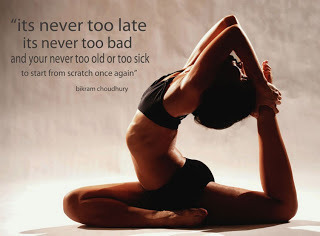
*you're...
My heart SOARED. I couldn't believe I lasted that long! Time seemed to melt away in that room right along with everything else. I went back in and they were doing the Camel pose. I felt better. Much better. Thanks to the heat, I was even able to rest on my knees for a little period of time. The rest of the poses were easier, and we spent a good bit of time in Savasana (Dead Body) between, which at that point felt like the longest, most wonderful vacation of all time. At some point, I felt like I wasn't even really there in my body anymore. I'd entered some other plane of existence where there were no other thoughts other than me hanging out in my body without judgment. Sure, it took nearly the full class to get there, but I was THERE, dammit!
We ended the class with some breathing exercises and then we laid back again into Savasana. That's when the instructor came by and laid cold, wet, lavender-scented rags on our foreheads. At that moment, it was like a light flashed in my head and rolled slowly through my whole body down to my toes. I just laid there for a moment, feeling this calm settle into my joints.
And when I got up from the floor... my muscles didn't protest in the slightest. I just... STOOD UP! I felt taller, lighter by about ten pounds. My muscles were quivering, but in a good way. When I stepped back out into that cool hallway, I wanted to cry. In fact, the tears were sitting there right on the verge of spilling down, and when the instructor came up to me and said I did wonderfully and that she hoped I was coming in for tomorrow morning's class, I said yes... I would be there. And I will.
After
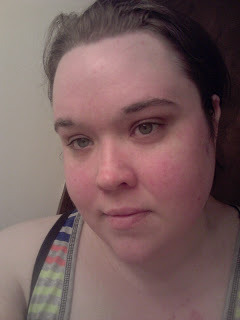
I glided out to my car, a sweaty mess, my hair everywhere. I drove home with the windows down--it was only about fifty degrees out, but it felt like a blessing. I felt like I'd just been born. I still wanted to cry, though I couldn't quite articulate WHY I wanted to do so. I came into the house, made myself something to eat. Calmly and slowly chewed and swallowed, tasting everything. Every movement I made felt as careful and deliberate as it did in class. I was reminded of how I felt after very long bouts of meditation at a couple of the Buddhist retreats I'd gone to years ago. And when I climbed the stairs to take a shower, I didn't even touch the handrail or the wall. No pain in my knee. My muscles were there for me, for the first time in a very long time, and I could feel them thanking me.
I can still feel it. And I did have that cry. I still kind of want to cry again. It's all part of the catharsis, I think. Of realizing yet again that I've sold myself short and that I'm capable of far more than I allow myself to be. No, my poses weren't beautiful or perfect. My body is like something that was sculpted out of marshmallows and apprehension. But I now know what I can do, and I look forward to seeing myself progress. Rhino today, flamingo... eventually. No rush. Every day is practice.

"I can't do that because I'm fat."
I can't skydive, I can't zip line, I can't run, I can't do a cartwheel, I can't sit with my legs neatly crossed, I can't swim a mile (oh wait... never mind, I CAN do that, check that one off the list).
But those are major things, and I don't feel troubled by much of that, anymore than I don't feel particularly troubled by my inability to carry a tune or memorize Pi beyond four digits. But then then my size started getting in the way of the little everyday things. My left knee hurts when I climb stairs or get out of the car. My lower back is a nest of electrified rusty nails, and my hips start screaming at me when I go for long walks. Climbing stairs is a laborious process that sometimes requires me to take each step one at a time like a toddler, depending on how my knee is behaving. Oh, and getting up off the floor from a sitting position? Good luck with that. That I have to hesitate to find out what the "weather" is like in my joints before bounding around is something that particularly irks me. For the first time in my life, I can feel my weight IN my bones. Believe it or not, even as a fat person, I've been able to glide quite reasonably through the day to day. I do my best to take large and confident steps, I hold my head up high and look people in the face and smile when I talk to them. I don't waddle. I sit up straight. But all those things have gotten so much HARDER over the last couple years. For the first time in my life, my body is telling me that I'm not a kid anymore.
But then there was always yoga staring me in the face. I've heard so many wonderful testimonials on what it does for the body, but I am also a Buddhist, so I am familiar with the concepts of what it can do for the mind too. But I kept putting it off, and gradually I stopped meditating too, and my spirit has suffered tremendously because of it. In recent weeks I've begun to feel that need again to tune back into myself, and I think the aches and pains I've been feeling in my body are signs that I need to do just that.
So I bought a Groupon. One month of unlimited hot yoga classes at a place less than a mile from my house. I considered it a Mother's Day present to myself. For the week following, I agonized over setting that appointment for that first class. I was making a fool out of myself, I thought. I was going to be a rhino in a room full of flamingos. Never mind that I also have psoriasis on my arms and hands, so yet ANOTHER way to stand out. I was a red-speckled rhino. Why not do yoga at home?
Riiiight. I'd long stopped being ashamed of my psoriasis. It's either put it out there into the world or hide, and I refuse to hide from anyone.
I even doubled down spent $90 on a new yoga wardrobe. And then I did what I do before I enter ANY situation in which I'm pretty sure I'm going to be the odd one out. I pull down the veil and power forth anyway and DEFY anyone to say any different. "Fake it until you make it" has been the one mantra that has guided me through most of my life, and it has fooled a lot of people into thinking I'm more confident than I actually am, but that's the point. And this morning, that mantra guided me right through the doors of Hot Yoga Dayton just before 8 a.m, towel and water and rolled-up mat in hand.
During

After signing the little waiver that stated I'm pretty much responsible for my own health, I put my purse and jacket and shoes in a cubby and proceeded into the yoga studio. It was dimly lit, thank goodness. And hot, yes. Definitely hot. Around 95 degrees and humid. But it wasn't all that bad, actually. I was prepared to be hot and I'd hydrated really well beforehand. I took time to briefly glance at all the people around me who were either sitting or lying on their mats. None of them were as big as me, but there were a few who were generous through the hips and whatnot. There were also a number of older people (the woman next to me was silver haired and likely approaching her eighties) and some younger people too. Everyone was quiet and nice and keeping to themselves. I felt comfortable. Or as comfortable as one can feel in such a warm space with absolutely no idea what's in store.
If you're not familiar with bikram yoga poses, you can visit this link to get an idea of what we did. And also keep in mind that anything I did was the absolute remotest approximation. But I'll get to that in a bit.
We started with a series of breathing exercises and warm-up poses. By the end of that little bit, I realized that was the hardest I'd worked my body in a very long time. But then we pressed forward, and I started to get a true sense of what my body was capable of and what it wasn't. I couldn't cross my legs and arms fully for the Eagle pose, let alone stay balanced for even 30 seconds in what derivative of it I could accomplish. There was no getting up on the balls of my feet for the Awkward pose. I think I was able to get my leg out to 45 degrees (or less) for the Standing Head to Knee, but staying balanced for that was also difficult. I wobbled. A LOT. I rocked the Triangle pose, but the Tree pose was utterly comical. Locust and Full Locust were more like Paralyzed Newborn (if there is such a thing) and instead of the Bow pose, I did the Bridge, which was a lot easier.
I took breaks for water whenever I needed to. There were a few times when I just had to sit there and let my heart rate slow down. My face was so red it looked almost bruised. My hair had come out of its little ponytail. My whole body was so slicked with sweat that I could wipe my hand down my arm and watch the beads fly off. I felt like I was inside a womb.
Then came a moment when I was starting to feel a little nauseated. Even though I was willing myself to remain in the room for the full 90 minutes, I noticed a few people who had to step out for a moment, so I felt like this gave me permission to do the same if I needed. I realize I didn't NEED this permission, but for my first class, I felt like I did need to get a sense of the proper etiquette. Anyway, it was just as we were entering the second rep of the Half Tortoise that I needed to break free. Stepping out into the hall was... I think salvation was the only correct word for it. I think I even uttered a half orgasmic moan and was thankful no one else was out there. I took a moment to look at myself in the mirror. So much sweat... There were even bits of crud coming out of my tear ducts. It was kind of gross.
At the same time, I was berating myself. I couldn't believe I stepped out. In my mind, I thought I hadn't even made it halfway through the class before bailing. So I checked my phone... It was 9:15. I had made it one hour and fifteen minutes out of the ninety.

*you're...
My heart SOARED. I couldn't believe I lasted that long! Time seemed to melt away in that room right along with everything else. I went back in and they were doing the Camel pose. I felt better. Much better. Thanks to the heat, I was even able to rest on my knees for a little period of time. The rest of the poses were easier, and we spent a good bit of time in Savasana (Dead Body) between, which at that point felt like the longest, most wonderful vacation of all time. At some point, I felt like I wasn't even really there in my body anymore. I'd entered some other plane of existence where there were no other thoughts other than me hanging out in my body without judgment. Sure, it took nearly the full class to get there, but I was THERE, dammit!
We ended the class with some breathing exercises and then we laid back again into Savasana. That's when the instructor came by and laid cold, wet, lavender-scented rags on our foreheads. At that moment, it was like a light flashed in my head and rolled slowly through my whole body down to my toes. I just laid there for a moment, feeling this calm settle into my joints.
And when I got up from the floor... my muscles didn't protest in the slightest. I just... STOOD UP! I felt taller, lighter by about ten pounds. My muscles were quivering, but in a good way. When I stepped back out into that cool hallway, I wanted to cry. In fact, the tears were sitting there right on the verge of spilling down, and when the instructor came up to me and said I did wonderfully and that she hoped I was coming in for tomorrow morning's class, I said yes... I would be there. And I will.
After

I glided out to my car, a sweaty mess, my hair everywhere. I drove home with the windows down--it was only about fifty degrees out, but it felt like a blessing. I felt like I'd just been born. I still wanted to cry, though I couldn't quite articulate WHY I wanted to do so. I came into the house, made myself something to eat. Calmly and slowly chewed and swallowed, tasting everything. Every movement I made felt as careful and deliberate as it did in class. I was reminded of how I felt after very long bouts of meditation at a couple of the Buddhist retreats I'd gone to years ago. And when I climbed the stairs to take a shower, I didn't even touch the handrail or the wall. No pain in my knee. My muscles were there for me, for the first time in a very long time, and I could feel them thanking me.
I can still feel it. And I did have that cry. I still kind of want to cry again. It's all part of the catharsis, I think. Of realizing yet again that I've sold myself short and that I'm capable of far more than I allow myself to be. No, my poses weren't beautiful or perfect. My body is like something that was sculpted out of marshmallows and apprehension. But I now know what I can do, and I look forward to seeing myself progress. Rhino today, flamingo... eventually. No rush. Every day is practice.
Published on May 25, 2013 09:24
May 20, 2013
I Would Love To Die On Mars

When I first heard about the Mars One mission being proposed, where a permanent human settlement will be formed on the red planet by 2023, I felt an immediate yearning. Four applicants will be sent on a one way trip to our nearest planetary neighbor to live in carefully built and interconnected habitats, with four more joining every two years. Science fiction author David Brin is one of the applicants, and you can read about the reasoning here.
I cannot even tell you how much I envy those who will be embarking on this journey. Whoever goes will be pioneers in the truest sense, setting foot on alien soil, ushering in a whole new era of exploration, and I want so much to be one of them, I can barely stand it.
Some people probably think it's nuts, of course. Selectees would be confined to small living quarters. If you ever wanted to go outside, you would have to wear a space suit. There would be no blue sky, no real air to breathe that doesn't come out of a can. Nothing green outside what you can grow yourself in your little indoor garden. You and your habitat would be subjected to the very hostile Mars environment replete with solar radiation (Mars doesn't have a magnetic field like Earth does, so it gets the full brunt of the sun's rays) and vast wind and dust storms that can enshroud half the planet for long stretches of time. Mars also gets very very cold, with the average temperature being -66F and down to -225F in other areas. The gravity on Mars is only about 40% of Earth's, so issues of human physiology in that environment over the long term will pop up, and we will ultimately have to answer the question of how certain functions, like human procreation and the babies that might result from it, would work. Over the long term, would the colonists even look or function like Earthly human beings? Doubtful. And this is alllll assuming that you would even survive the 6-8 month journey in a tin can soaring through open space.
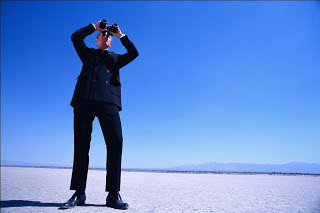
That's really only the tip of the iceberg of questions and challenges that those people will face on the Mars One mission. But that doesn't negate the fact that I would love to be one of the people to offer myself up to help answer those questions. I have been a space junkie for as long as I can remember. The study of planets and stars and galaxies and black holes and everything in between has cultivated in me a sense of awe that is in many ways the basis of my spirituality. Somewhere it's coded in my DNA that innate desire to make footprints on another planet and eventually die there. I have a strong wanderlust. My instincts are that if I die anywhere near the place I was born, especially if I haven't seen a huge chunk of the world first, I will have failed the ultimate mission of my life. I'm already approaching my mid-30s and still have yet to leave the U.S. In many ways, already feel like a failure. I'm the antithesis of Dorothy from the Wizard of Oz. Home is great and all, but I have always felt that shelter can only be shelter too long before it becomes a self-imposed prison. I think it is in our base nature to wander and discover and learn. We just sometimes scare ourselves out of doing so, we find what we think are valid reasons for staying put, and that is when we stagnate... like fish that stopped swimming and sank to the bottom of the sea.
I have come home for a few years after being away for a decade, but I don't intend to stay here for the rest of my life. This world is too big and too amazing for us to remain in one place indefinitely. This universe too big. I sometimes feel like I was born 300 years too soon, because if it were up to me, I would be soaring through the cosmos right now.
Who knows. Maybe one day that distant dream of mine will come true. Perhaps not on the Mars One mission but on some other. If humanity continues to advance along on these tracks, who is to say where I will be in another 30 years? Maybe I will be writing books on Mars or on one of Jupiter's moons when I'm 65. A distant distant dream, but one that fills me with wonder every time I think about it. No, I haven't applied, though I've considered just filling an application out like someone tossing a penny into a wishing well, certain that nothing will actually happen but that the act of doing it will fulfill at least part of that internal longing. Perhaps one day, I can at least have the memories implanted of my having already been there. Sounds like the basis of a good story...
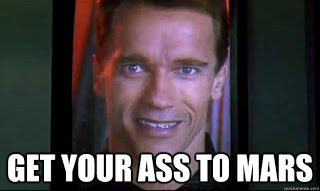
Published on May 20, 2013 09:19
May 17, 2013
A Fistful of Pennies: My Ebook Price Point Woes

See what they did there?
I'll just come out with it arrogantly. I think my work is worth more than a buck. Actually a great deal more. I'm well-reviewed. I get the sense that people enjoy most of my work, so why shouldn't I be able to command higher prices? If I thought I could get away with it, I would charge $2.99 for my short stories and $9.99 for any novel I put out. In other words, Big 6 prices. After all, how is their time spent at a keyboard more valuable than mine? Yes, those prices reflect more overhead (gotta pay the publishers, editors, artists etc etc), but you know what? I have overhead too. It's called rent and groceries and gas. At those prices, if people were willing to pay them, I would also be able to afford more editors and artists. At my current $.99 sales rates, I would be making real, substantial income with my writing. More money than I would make at any part time job I would find outside the house to supplement my husband's income.
But it doesn't work that way. Don't ask me WHY it doesn't. It just doesn't. Stephen King can get away with asking $2.99 for a short story, but I am not Stephen King. There are a lot of factors that go into deciding what gets charged for ebooks, but never is it based on the question, "Is the author getting a fair wage for his or her work?"
Here's some boring (and depressing) math. My most recent release, a 15000 word novelette called The Empathy of Agnes Winters, took about, I would say, 40 hours of work. It may have taken more than that, but I'm going to stick with easy numbers. That hour count includes all the raw writing, the editing, and the cover design. I would have to make $312 on that story to qualify for minimum wage ($7.80/hr in the state of Ohio). At my current royalty rate of $.35 (I'm selling it right now for $.99, because it wasn't selling at $1.99, but I'll get to that in a minute), I would have to sell nearly 900 copies to make $312. EIGHT-HUNDRED NINETY ONE to be exact.
I could be wrong, but I don't think I've sold 900 copies of anything. I've given away that many, absolutely, but sold? For money? I would have to dig back through two years' worth of sales records, but I think "Dust" may be the only story that has come close or passed that mark, and again, that's taken over two years.
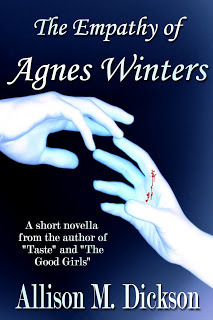
Help the poor. Buy indie.
So at $.99, it will take a minimum of two years to make minimum wage on one story. This is why I sell so many stories (and why you should too). Because cumulatively, maybe I can make a minimum wage salary on my work. Eventually. I could make more money on a collection of stories, but I've had mixed results with that attempt, and I will have to create a separate article to address it another time.
You're probably wondering why I'm not asking more. Good question. I've tried. Believe me, I have tried. For the last two months, I have been asking $1.49 for my short stories instead of $.99. I figured even if my sales dropped off a little, I would still come out on top because one sale would nearly equal TWO of what I was making at the $.99 price point.
Well, my sales didn't just drop off a little. They stopped almost entirely. In the whole of April, at $1.49 price points, I only managed to sell around 40 books, a fraction of what I typically sell. Sales usually do drop off in the spring for me, as they do for a lot of other authors I know. My best season is November - February. But this was a precipitous drop, such that the increase in royalties wasn't making up for the drop in sales. I saw no choice but to flip back to $.99 and to see what would happen. And sure enough, though sales are still slow as they normally are this time of year, things normalized and I have already passed April's totals. This tells me that the $1.49 price point was no good and I should probably avoid it. Furthermore, smaller sales even at a higher royalty rate = fewer readers. If I had to make a choice between more money and more readers, I'll always take more readers. At least with adding readers to your roster, you have a chance to make up for the money in volume.
Smashwords recently released a survey of indie book readers showing, among many other helpful metrics when it comes to buying habits, popular price points. $.99 and $2.99 were the most popular, but $3.99 was becoming even more popular for novels. Things dropped off considerably above five dollars for indie authors. $1.49 and $1.99 were complete black holes for sales regardless of short or long fiction and it was suggested that people avoid them entirely. Also, not surprisingly, cheaper books sell more copies overall, and the longer the book the better it sells.
In short, it appears that the $.99 price point for short fiction, for better or worse, is the best one. I don't like it. I don't have to like it, but if I want to make at least a meager income while attracting new readers, it's where I have to be. Now, when I release a novel independently, expect the price to be around $3.99. I don't know what the price will be for my traditionally published books coming out this year, but I expect it will be around that, give or take a buck.
Yes, I think I'm worth more than a dollar... or the thirty-five cents I'm making on every dollar. But artists rarely make what they think they're worth. They make what people are willing to pay.
Published on May 17, 2013 05:39
May 2, 2013
My Sweet Spot
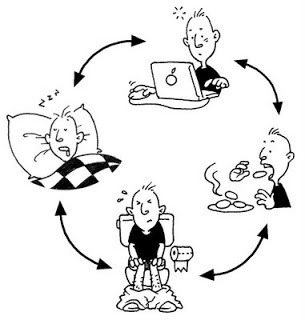
I read a great little article today on Lit Reactor about how to build a writing routine, and I think it's definitely a topic worth addressing, because whether you're just starting out writing or if you're a pro, you may have trouble nailing down the reasons why some days you write like gangbusters and others you can't seem to force out more than a measly "the" before calling it quits.
Some of this can be attributed to lack of inspiration or being stuck in a plot dead end, but I think it's mainly because of something we didn't do to properly prepare ourselves for the task. Like any other job we do in life, be it cooking, working out, going to our day jobs, or doing homework, a ritual or at least an acknowledgment of some necessary preparation is in order. I'm not the most routine oriented person I know. Sometimes I write a lot in the morning, other time I burn the midnight oil, but I have found that a certain set of parameters has to be put in place in order for me to work to an optimum level, and it's going to be different for everyone. In order to find what works best for you, follow the suggestion in the Lit Reactor article by keeping notes after you finish, detailing what you ate, what time of day it was, how much sleep you got, etc, so you can see a pattern emerge.
Me, I didn't take notes. I guess if I'd read this article a few years ago I would have considered it, but it took me a couple years to discover the things that work for me and keep me on a regular enough writing routine that (while not daily) help me to complete 2-3 novels per year and about 7-10 short stories. I could do better if I completely gave up the internet, but fuck that. Most of my suggestions have to do with how you treat your body, and there is a good reason for that. A good body equals a good mind, and a good mind is a productive one.
1. Get Plenty of Sleep

Because everyone looks like this when they sleep...
90% of the writers I know absolutely insist on the magical powers caffeine to help them write billions of words, and the association between writers and coffee is about as plain as the one between Colonel Sanders and fried chicken. But I guess I'm odd or something, because I don't require much if any caffeine to write. My coffee drinking seems to coincide with seasonal changes more than anything. As of right now, in the full swing of springtime, I haven't had a cup of the stuff in a month, and on the days when I do feel like I need coffee, it's because I didn't get enough rest the night before. If I don't have my requisite seven hours a night, I feel dopey in the morning. Nothing gets done, let alone the writing. I love being up during the wee hours of the morning, but doing that and sleeping until the early afternoon hours to compensate for it just doesn't mesh well with the whole having a husband and kids thing. If you're a regular coffee drinker and you find you still can't get the mojo to write on a regular basis, consider whether you're getting enough sleep at night and make some adjustments.
2. No Food

But only after you write
Oh look at me, recommending a starvation diet. I'm actually not doing that, but the article mentioned how food can be a creativity killer, and I couldn't agree more. I've been on fasting-style diets and found that when my digestive system wasn't being taxed at all, I was in sort of a writer nirvana mode. Of course, I can't sustain myself long on diets like that and I'm not saying you should start fasting or even that you should write while feeling physically hungry (because that's just as distracting). But you might consider not writing after you've just had a meal. You might be the exact opposite, but to me, writing on a full stomach is a lot like exercising on a full stomach. Both make me feel sluggish and wrong. On a typical morning following a good night of sleep, I start the day with a very light snack (a piece of fruit or cheese or something) and have some water or juice. Then I'm ready to commence writing. On days when I'm really in the heat of a project, I will typically not break for an actual meal until about 2pm. Of course, this throws off my dinner schedule if I eat too much, so I try to keep it light and then have my big meal around 7 or 7:30 that evening. I didn't say it was good for the metabolism, but that's why exercise is probably a good idea. Which brings me to my next point.
3. Move Around, Dammit
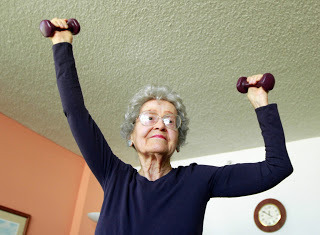
Me in fifty years, before I start an important scene
I'm the least disciplined person I know when it comes to working out, as I detailed here recently, but even making a little effort to move can mean a boost to the word count, provided it's LIGHT exercise. When I was swimming a mile a day, I wasn't writing much. I was too damn tired, and the sensation of finishing a long swim was not unlike the sensation of finishing a book, so I found I didn't have much left for the page when I got home. But if I don't exercise at all, I feel like crap. And all that sitting with no moving around is just bad for anybody. So again, finding the balance is key. Get out for a little walk, clean your house, lift some free weights or do some calisthenics or yoga or something before you sit down to write. I submit that getting your blood flowing this way vs artificial chemical stimulation via coffee or energy drinks is the way to go. That and you'll just feel better overall.
4. Kill Your Distractions

Before they kill you...
The article was so right on about that, and I'm sure I've talked about this before, but you definitely have to find a way to deal with outside distractions, especially early on in your career when your confidence is probably shaky and you haven't proven yourself able to finish much of anything. Even if you can't get away from the internet, unplug your router. Or if that would make things too inconvenient for anyone else trying to use the internet in your house, there are programs that will disconnect the internet from your computer for a set amount of time (I particularly like Freedom). Consider a device for writing that has no internet connection, like pen and paper or an Alphasmart. Turn off your phone if you can. Go in a room and shut the door or tell the people in your life that you are not available during certain hours of the day, that your writing IS a job and they should respect that and to not call you or knock on your door unless they are dying a spontaneous case of advanced syphilis.
5. Make Sure You're Writing What You Want
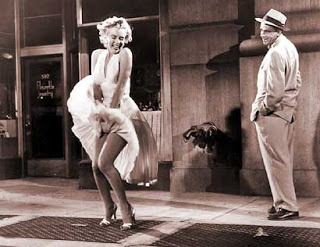
Maybe you want to try something else for a bit...
I hear from a lot of people who are just having a hell of a time finishing a story they started, or they've thought about it a long time and have plotted and researched a ton of stuff, but just can't seem to get it off the ground. We all hit bumps in the road with a project, and I don't want anyone to think that having an off week means you shouldn't be working on your current WIP, but I think if the problem becomes pervasive enough that it's NOT getting finished and you're becoming discouraged as a writer in general, then it might be time to do a little soul searching and maybe try something else. It's a well-known wisdom that the most important part of being a writer isn't just writing, but finishing what you write, and I agree with this. But there is a fine line between torturing yourself with a piece of work that is making you resentful of the craft and making you LESS productive overall and working on something that you know you CAN finish. The key is to choose a project that keeps your enthusiasm up, that doesn't feel too arduous, and is sustainable enough that you know you can get it done, provided all the other things are in place. Maybe at some point your inspiration for the other piece will return, but in the meantime, I think it's important to busy yourself with writing you can finish.
Published on May 02, 2013 13:17
April 30, 2013
The Most Important Diet I Ever Went On. And I'm Not Talking About Food.
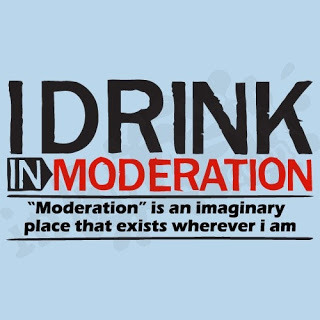
We like the phrase "all things in moderation." It gives us permission to do things we know are bad for us but can't quite seem to give up. And that's okay. I'm all for hedonistic pleasures and feel that strict austerity and celibacy (in the material sense as well as the sexual) is a miserable way to live. For instance, I love gin and beer and chocolate cake and boxed mac & cheese and eighties pop music. I partake of these things from time to time. They make me happy, even though I know they aren't exactly healthy. But I don't do it every day, because I find things like water and tea and fruits and vegetables and Radiohead are just more in tune with my body and soul, and I want to live a long life.
Some bad things are very hard to moderate. Like, say, cigarettes. I used to smoke. I loved smoking. I think deep down I will always love it. But I had to stop doing it because it was killing me and making me feel and smell terrible and robbing me of money I much prefer to spend on things like groceries, rent, a Spotify subscription, and the occasional bottle of good quality beer and gin. So I quit smoking for good. Oh sure, I've been known to quit for a couple years and start up out of the blue for a little while (when things get really stressful) and then quit again out of the blue. And for a while, I was pretty good with that cycle. But then I got a case of bronchitis that lasted about six months. During that time, I couldn't lay down without having this horrific wheeze deep down in my chest that sounded a lot like Linda Blair from The Exorcist. At first I thought it was related to acid reflux (which, oddly, was also related to the smoking), but even after I stopped smoking and went on a pretty intense vegan diet and removed any other dietary triggers from the equation, the wheeze never completely went away. Thoughts of emphysema or some other form of COPD were the next things to go through my head, and that's when I REALLY got scared. Finally, I broke down and went to the doctor, where I was given a breathing treatment, some antibiotics (to rule out any infection) and some steroids.
Well, something in that cocktail worked, because after a couple days of eliminating huge gobs of green phegm that had been living in my chest for months, I finally coughed up something so huge and vile that I almost choked to death in the process. It was semi-solid and filled the palm of my hand, and it was about the color of a green Jolly Rancher. I have a picture of it, but I won't post it here as I'm sure my prowess as a writer and knack for description put a revolting enough image in your head. After that terrifying moment, I never wheezed again and I have never even so much as craved a cigarette (and believe me, I've had a lot of stress in my life since...not once did I think to go buy a pack of my trusty menthol coffin nails).
Don't worry. I'm getting to my point now.
There is another thing that is very much like cigarettes. No amount of moderation is safe, and it's doing to our culture what smoking was doing to my lungs.
It's called cable news. Fox, CNN, MSNBC.

He's saying a lot, but I'll boil it down: "Derrrrrrrrrrp."
Have you ever noticed if you're sitting in a group of people and the topic is some current news event, that everyone in the group is saying completely different things? That even their facts are different?
Thanks, cable news!
Have you ever noticed that after some high profile crime happens... like, say, the Boston Marathon Bombing... that the suspects become living and breathing (okay, only one of them is living and breathing, but whatever) exhibits of Schrodinger's Cat? They're jihadists, but they're not. They're white, but they're not. They're the member of an organized terrorist cell, but they're not. You get the point.
Thanks, cable news!
Have you ever noticed that people are more angry and less likely to engage in thoughtful, intelligent discourse these days? That they're more likely to retreat to outposts that reflect not the truth, but their political leanings?
Thanks, cable news!
Have you ever noticed that indignant outrage never really goes away, but only changes its shape, and that this change often coincides with the rhythm of the news cycle?
Thanks ever so much, cable news!
And that's not all. Honestly, I think ever since 9/11, the thing that has hurt our democracy the most is not the Patriot Act or the wire taps or the general distrust of brown people (all bad, yes). It's the way we started covering the news. What was once a thoughtful analysis that people took the time to fact check before tossing it out into the pool is now a glitzy, well-coiffed race to see who can fill the most empty space with the most meaningless and/or potentially harmful words possible. It's like professional wrestling, but it takes place with people in suits behind gauche desks, where news crawlers with even MOAR INFORMATION run below them, like a ticker tape of cynicism and misery. They consistently pit one ideology against another and then "let the people decide" what's truth and what's crap, because if there is anything your average overworked and underpaid American loves to do, it's sift through metric fucktons of bullshit to find the one kernel of truth.

INFOSPLOSION!!
As the President Obama recently put it at the White House Correspondent's Dinner: "I know CNN has taken some knocks lately, but the fact is, I admire their commitment to cover all sides of the story, just in case one of them happens to be accurate."
But it isn't just CNN. It's all of them. And yes, even my pinko liberal ass is pointing to you, MSNBC, because it isn't just what you say, it's how you say it. Each network uses the same delivery method of bombarding the viewer with information and graphics and words words words, and ask questions later, or ask questions now but so many questions that none of it has any real meaning. Increasingly, this disease is moving off the cable networks and onto the regular ones too. I don't care what your political ideology is. This whole process, if you will, is hurting us. You want to talk about how Congress is full of a bunch of do-nothing blowhards who are holding hard to their ideologies and not giving an inch to the other side? That's because they exist in this toxic ecosystem that is fed a steady diet of cable news sludge.
Politicians are nothing if not a reflection of their brain-addled constituency. THANKS, cable news! You want to see an improvement in the people we put into office? Stop watching election coverage on the major news networks.
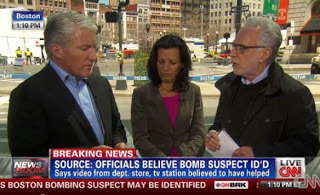
Three people standing around saying whatever shit they want. That's news today.
So this diet I talked about that had nothing to do with food? That was it. I stopped watching these networks a number of years ago (around 2004 or so, when ol Dubya won re-election). And wouldn't you know, my blood pressure improved right along with my outlook on humanity, and my overall temperament and level of fear and paranoia smoothed right out too. I hate people a LOT less than I used to, and it's all because I stopped watching that mind-numbing screed.
I also feel smarter since giving up the "chatter." The ultimate effect of this machine gun of information is that it dulls your brain's ability to think critically. Once you stop that bombardment and put some space between yourself and "what's happening right this second," you find you can breathe and think rationally. It was hard enough watching the news unfold about Sandy Hook and the Boston bombing without that steady diet of talking heads. I can't even imagine how much worse off I'd be right now if I'd had that shit turned on. Hell, even watching it for fifteen minutes as it plays in some restaurant while I'm eating has a way of turning my stomach and elevating my heart rate.
Do I think there is any such thing as an unbiased news source? No. There never has been. Do I think there are some good eggs working in the cable news biz? Absolutely. I like Anderson Cooper and Rachel Maddow quite a bit. But am I ready to throw those babies out with the bathwater if it means improving my overall state of mind?
Fuck yes.
People have always had the onus of separating the wheat from the chaff when it comes to the information they're getting from the media. But what's made this more challenging than ever is that there is so. much. chaff. It becomes overwhelming after awhile, and that's what the networks depend on. They don't want you to think. They want you to let them think for you, and in doing so, make them very very rich.
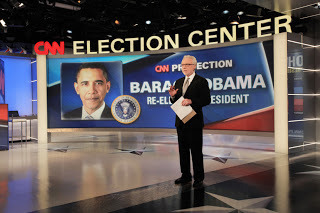
Watch us, because we need to be able to afford this completely unnecessary 500-foot-long screen!
Beneath every yammering word coming out of their mouths is this: "Here, you've had a long hard day... let us fill your mind with so many words and flashy things that you won't want to question anything anymore."
That's the methodology. And the sooner people realize that, the sooner they can stop feeding these networks' coffers with ratings, and the better off the human race will be. Go on a cable news diet. You won't regret it.
Published on April 30, 2013 07:32
April 26, 2013
On the Merits of Retiring a Book (or Two)
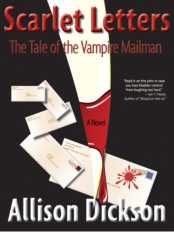
Buh-Bye
For the last few years, I've had two novels up for sale. Few people knew about them and even fewer people bought them. I can't blame them, but I'll get to that in a second.
If you're wondering, the titles were Scarlet Letters: The Tale of the Vampire Mailman, and The Stargazers.
Again, you probably didn't notice when I took them down. That's probably because you didn't notice that they were there. Or if you did notice, you didn't care that they were there because they were nothing like the dark horror/suspense/sci-fi you've come to expect from me.
And that's okay. Honestly, this whole self-publishing thing is still an act of trial and error. Things change. Authors have books taken out of print all the time, so this is really not that much different. But the main reasons I've taken these books down are as follows:
1. They Suck
Yes, they really do suck. Maybe you liked them and that's great and I appreciate that (and I do of course have a soft spot for both of these books, but for different reasons than any reader would), but to me they represent a lack of refinement and certainty of who I am and who I want to be as a writer. Okay, sure, you can argue that all authors have rough early work out there. The Stephen King who wrote 11/22/63 is certainly not the same King who wrote Rage, and I will give you that but with one caveat. At least when King wrote Rage as a young man, he knew he was an author of horror and dark fiction. *I* knew when I wrote Scarlet Letters and Stargazers that I too was an author of horror and dark fiction -- BUT NEITHER OF THOSE STORIES REFLECT THAT. Let "Aria," which is my earliest horror tale, serve as the representative of my rough early work. But these two other books are a total mismatch, and this has always bothered me. And it's made these books very difficult to sell as well. Which brings me to my next obvious point:
2. They Weren't Selling
Like at all.
Not selling.
At all.
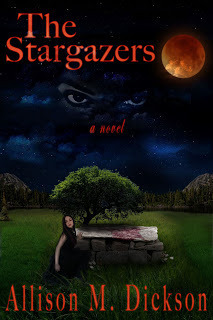
Annnd...buh-bye
Oh sure, I could GIVE them away, but that wasn't how I wanted it to be. The fact is, the people who like my short stories (which really represent my brand best of all right now) weren't into reading girly fantasy or silly humorous vampire stories. It's one reason why I had trouble penning sequels for either of these books (even though I had ideas for both of them, good ones). But I'm not going to spend the next several months of my life writing a follow-up to a book that hasn't sold a single physical copy in three months. Not gonna happen. not gonna. I have better fish to fry. Like writing follow-ups or expansions to stories I sell the most of every single month (paid sales) and have been at the top of the sales charts on Amazon numerous times. That is where my demand lies, and that is where I must concentrate the core of my work if I hope to make anymore bucks in this business.
3. They Weren't Reflecting My Brand
That isn't to say I will never write something humorous or in the fantasy or other non-dark horror/suspense/sci-fi genre again. I very likely will (and I have since I wrote either of those books). But at least when I do release things "off-genre" now, I'm standing on a very firm platform of being the dark fiction/horror girl who just released a funny story for shits and giggles. Furthermore, those funny stories have a lot more of "me" in them than either Scarlet Letters or Stargazers. When I wrote both of those books, I was still very much finding my way in terms of just learning how to write and finish a novel. They were the equivalent of teething rings. That I even finished them at all was a testament to my desire to write words for a living, period. But that doesn't mean that I had to have those things up for sale. Any other self-respecting author would have stuck those in a trunk and moved on. Me, I tried to query agents and publishers with them and then sell them myself, and for that I am sorry.
4. They Weren't Edited Real Good
The main critique I received on either of those titles was that they needed better editing. Especially Scarlet Letters. And they were right. Editing short stories is a lot easier than editing novels, which is why I hope to have all of my future novels released by a publisher, because at least then I will have a lot more professional help with that process. At the very least, if I do release another novel on my own, it will be put through the wringer much more thoroughly that way.
Finally:
5. There Is Awesome Shit Coming
Seriously, you guys, there is so much great stuff in terms of novels in the pipeline, I don't want anything sub-par competing with any of it. First is The Last Supper, which is VERY close to its release. Then there is Strings, which I'm so excited about I could just pee myself. There is also the steampunk adventure I co-authored with my pal Ian Thomas Healy being released this September. Colt Coltrane and the Lotus Killer is SO close to being done and you will likely be seeing that one in 2014, provided I haven't found a publisher for it by then. I couldn't be prouder of these books. It's taken a long time to get to this point in my career (five years), but after feeding you a lot of short stories and a couple sub-par novels, I think you will find it worth the wait. That so many of you have been there following along, watching me triumph and fail and find my way in this crazy business means the world to me, and it thrills me to no end that you will be here to see it move up to the next level.
There are a lot of things I liked about Stargazers. It was ultimately a very personal story for me, but told so obliquely that I don't know if anyone actually got that. If anything, I would like to revisit the THEME of that story again someday.
Scarlet Letters is the hardest one of all, because I've re-read that book recently, and I think it's funny and a decent enough read. I am proud of it in a lot of ways, but it was not a book that was written at the right place or the right time. Or by the right author. Either way, it's time to move on.
Published on April 26, 2013 09:31



